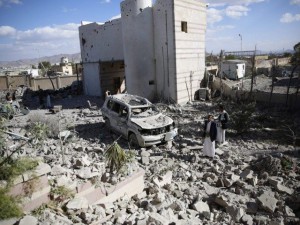A resurgent al-Qaeda in the Arabian Peninsula (AQAP) is capitalizing on the deadly civil war in Yemen, emerging as the strongest jihadist group in the country while a Saudi-led coalition concentrates on routing the Shiite Houthis and the West focuses on the Islamic State (ISIS/ISIL).
The U.S.-backed Saudi-led coaliton in Yemen has been fighting the Houthi rebels and their allies, forces loyal to former Yemeni President Ali Abdullah Saleh, as well as trying to restore the internationally recoginzed government under Yemen’s current leader, President President Abdu Rabbu Mansour Hadi.
Amid the chaos, AQAP, considered the most dangerous branch of al Qaeda, is enjoying a rapid resurgence, taking control of much of southern Yemen.
The Fiscal Times reports:
Taking advantage of the turmoil, the terror group holds more lands than the Houthi rebels, stretching vertically in the center of the country for 270 miles from the Saudi border in the north to the Arabian Sea in the south, and 420 miles horizontally from north of Aden, Yemen’s second largest city in the southwestern corner of the country, to the village of Qusay’ir in the east.
Last Saturday, al-Qaeda militants stormed the town of Ahwar that connects two of the terror group’s controlled territories on the Arabian Sea. After killing a local leader of the town, they raised their black banners on the government buildings. Al-Qaeda hasn’t been this strong since a decade ago, when it controlled much of the Sunni parts of Iraq before the U.S. surge of forces in 2007.
Three Yemeni provincial capitals are now run by al-Qaeda. The port of al-Mukalla on the Arabian Sea, the country’s fifth largest city and the capital of Yemen’s largest province in size, was captured by the terror group in April 2015 after a two-week battle. The militants released 300 inmates from the city’s prison, including top al-Qaeda’s commanders. They also captured several army camps with dozens of tanks, a military airfield, a presidential palace, an oil facility and the branch of Yemen’s central bank that held millions of U.S. dollars.
AQAP now controls more land than the Iran-backed Houthis in Yemen, while the ISIS branch in the country remains smaller than both groups.
Nevertheless, The New York Times reported in December 2015:
A new branch of the Islamic State that has quietly grown in strength and appears determined to distinguish itself as Yemen’s most disruptive and brutal force, carrying out attacks considered too extreme even by the country’s branch of Al Qaeda…
American intelligence and counterterrorism analysts say the Qaeda affiliate, Al Qaeda in the Arabian Peninsula, remains the most urgent militant threat in this fractured country. But they are closely watching the effort by the Islamic State, also known as ISIS or ISIL, to peel off defectors from Al Qaeda’s wing here.
Some analysts argue that by supporting the Saudi-led coalition, which turns a blind eye to AQAP and ISIS activities in Yemen, the Obama administration is actually helping the al Qaeda branch grow in the country.
In fact, AQAP is reportedly growing stronger without any opposition in Yemen despite the threat it still poses to the United States, writes Katherine Zimmerman, lead analyst on al Qaeda for the American Enterprise Institute’s Critical Threats Project.
The Long War Journal reports that the U.S. drone campaign against AQAP is not working:
Although AQAP has lost several key leaders in American drone strikes since early 2015, this has not slowed al Qaeda’s guerrilla war…Not only has AQAP continued to gain ground, it also quicklyintroducednewleaders to serve as public faces for the organization.
U.S. community intelligence chiefs highlighted the threat of AQAP while recently testifying on Capital Hill.
“Al Qaeda affiliates are positioned to make gains in 2016,” Director of National Intelligence (DNI) James Clapper told the House Intelligence Committee Thursday, reports NBC News.
Lt. Gen. Vincent Stewart, the director of the Defense Intelligence Agency (DIA), recently told lawmakers that al Qaeda “remains a serious threat to U.S interests worldwide.”
U.S. intelligence officials are also “concerned al Qaeda could reestablish a significant presence in Afghanistan and Pakistan, if regional counterterrorism pressure deceases,” added Gen. Stewart.
breitbart.com



